
Français
Le 21 octobre, départ pour Bukhara ! Notre train part de Samarcande vers 10h et arrive à Bukhara à 12h30. Nous avons la chance d'être invités 2 jours chez Rakhima, une Ouzbèke rencontrée sur Couchsurfing. Avant d'aller chez elle nous achetons nos billets de train pour Nukus, où nous irons le lendemain soir. Nous prenons ensuite un marshrutka qui nous amène au point de rendez-vous avec Rakhima.
English
On 21st October, we take the train to go to Bukhara. Our train leaves Samarkand around 10 am and we arrive in Bukhara around 12:30 pm. We plan to stay 2 nights here, we have the chance to be invited by Rakhima to sleep at her home. Before leaving the train station, we buy our tickets for Nukus, our next stop in the Western part of Uzbekistan. However there is only night train, so we decide to buy our ticket for tomorrow night (and so stay only one night in Bukhara). Then we take a marshrutka to the city center and we ask someone in the street to call Rakhima, so that she can come to pick up us.
Français
Sur le chemin nous faisons connaissance avec elle. Elle travaille dans un hôtel et parfois aux champs lors de la récolte. Par exemple, en ce moment c'est la récolte du coton. Elle vit avec ses parents et la famille de sa sœur, tous dans la même maison. Elle a beaucoup voyagé dans le passé : elle a vécu en Turquie et en Chine. Maintenant elle est en train de faire construire une auberge qu'elle compte ouvrir l'an prochain. Elle est très familière avec Couchsurfing, elle invite très souvent des gens à dormir gratuitement chez elle depuis 2009.
English
On the way to Rakhima's house, we learn to know each other. She is working in an hostel, but she also sometimes works in the fields (for example now it's the harvesting time for cotton). She is leaving with her parents and her sister' family in the same house. And she has traveled quiet a lot in the past: she has lived in Turkey and China for instance. She is now building a guesthouse that she hopes to open next year. She is inviting people at home via couchsurfing since 2009, so she is like an expert host ;-)

Français
Dès notre arrivée elle nous propose de déjeuner : du riz et
de la courge. Après le repas nous partons visiter la ville (sans
Rakhima qui a des choses à faire). Les rues près de chez elle sont étroites, ça ressemble à un petit village de maisons en
terre.
English
When we arrive, she offers us lunch: rice with pumpkin. Then she has to help her mother and on our side we go to have a look of the city center. We are walking in small streets before reaching the center of the town. It looks like a small village in the desert, with houses made with earth and narrow streets.
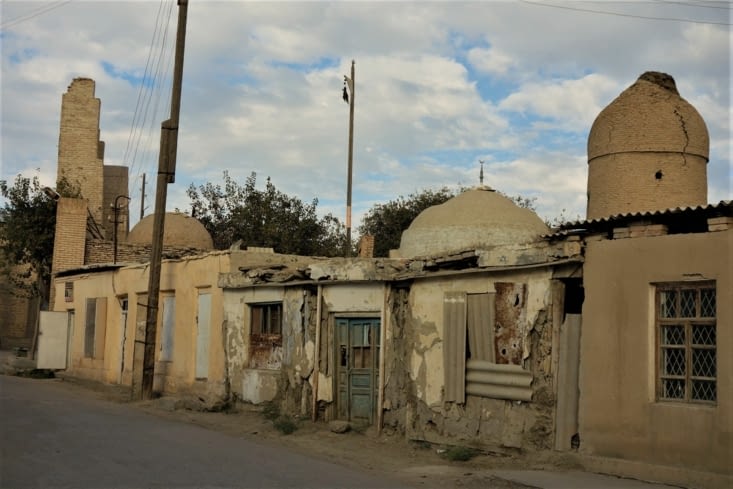

Français
Il n'y a pas la même atmosphère dans le centre ville. Nous ne savons pas où poser les yeux. Il y a de magnifiques monuments partout ! On peut facilement imaginer comment c'était du temps de la route de la Soie, avec des chameaux et des marchands partout ! C'est comme retourner dans le passé. Il y a beaucoup de madrassa et de ruines de caravansérail. Nous admirons d'abord la madrassa Gaukushan avec ses minarets et ses multiples dômes. Ensuite nous allons aux ruines d'un caravansérail près du bazar de Taki Sarrafon où il y des magasins pour touristes (pas vraiment intéressants).
English
Once in the center, it's not the same feeling, very nice buildings are everywhere. We can easily imagine how it was at the time of the Silk Road, with camels and traders everywhere. It's like a return in the past. There are a lot of madrassas and ruins of caravanserai. First we see the Gaukushan madrassa with its minaret and several domed roof. Then we reach the ruins of a caranveserai near the Taki Sarrafon bazaar where there are several shops for tourists.
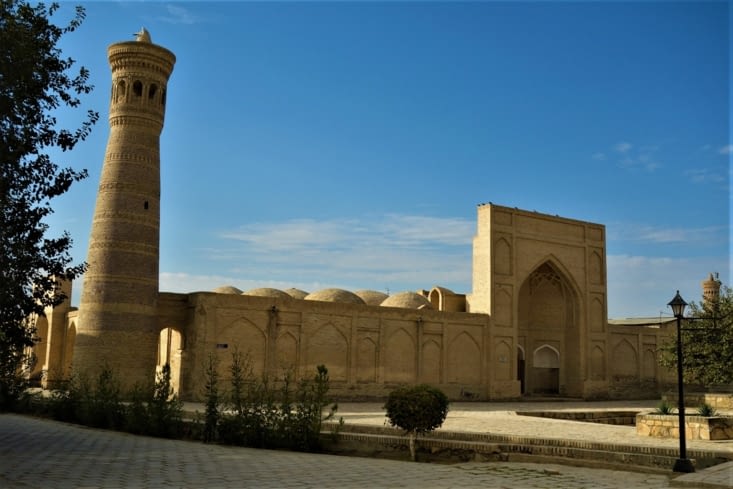
Français
Bukhara était célèbre pour ses piscines, qui étaient l’une des principales sources d’eau de la ville et étaient utilisés pour se laver. Malheureusement ces bains à ciel ouvert étaient aussi connus pour apporter des maladies. Lorsque les Russes prirent la ville au 20ème siècle, ils reconstruisirent une partie de ces bassins. Sur la place principale de la ville se trouve un grand bassin, nommé Lyab-i Hauz, entourés par les madrassas Nadir Divan-Beghi et Kukeldash à l’est et au nord et par le khanaka Nadir Divan-Beghi, à l’ouest, qui servait à l’accueil des pèlerins soufis et comme lieu de retraite. Un peu plus loin se trouve l’une des plus vieilles mosquées de la ville appelée Magoki Attor. Elle fut construite autour du 12ème siècle sur le site d’un temple zoroastrien.
English
Bukhara was famous for its ponds, which were used for washing and were one of the main sources of water of the city. Unfortunately these ponds were well known for bringing diseases. When the Russian took the city in the early 20th century, they rebuilt part of the ponds. The main place of the city has a quiet big pond called Lyab-i Hauz, surrounded by the Nadir Divan-Beghi and the Kukeldash madrassas in the East and North, and by the Nadir Divan-Beghi khanaka in the West. The khanaka was used as a guesthouse for Sufi pilgrims and as a retreat place. Not far from the pond, there is one of the most ancient mosques of the town, called Magoki Attor. It was a Zoroastrian temple at the Pre-Islamic period and then became a mosque in the 12th century.

Français
On continue notre
visite par l’un des trois marchés couverts encore sur pieds, Taq-i Telpaq Furushon. Ils sont notables
pour leurs toits en forme de dôme. C'est désormais occupé par des magasins à
souvenirs mais dans le passé chaque marché était spécialisé dans un
domaine : les couteaux, les vêtements, les chapeaux,... Ensuite, nous
passons devant la madrassa d'Ulugh beg, dont le portail présente des colonnes torsadées caractéristiques du style iranien.
English
We continue our visit
with one of the three remaining covered markets of the city, Taq-i Telpaq Furushon. It is very famous
for the domed roof. Now it's the place of tourist shops, but in the past, each
of these markets was specialized in a kind of supplies (knifes, clothes,
hats...). Then we pass in front of the madrassa
of Ulugh beg, whose doorway has twisted pillars in the Iranian style.
Français
La seconde partie
de la ville est vraiment magnifique : la madrassa de Mir-i Arab fait face
à la mosquée Kalân, toute aussi belle, et au milieu trône son minaret, appelée
la Tour de la Mort, car selon la légende, les
criminels étaient jetés depuis son sommet. Ce minaret est
particulièrement intéressant pour son architecture : elle fait 45,6 mètres
de haut, son diamètre est de 9 mètres à la base et de 6 mètres à son sommet.
Elle date du 16ème siècle et n’a jamais eu besoin d’être
reconstruite.
English
The next part of the city center is quiet amazing: the Mir-i Arab madrassa is facing the Kalân madrassa, as beautiful as the other, and in the middle stands its minaret, called the Tower of Death, because according to the legend, criminals were thrown off the top of it. This minaret is very interesting for its architecture: it’s 45.6 meters tall, its diameter is 9 meter at the bottom and 6 meters at the top. It was built in 16th century and has never been necessary to rebuild it.
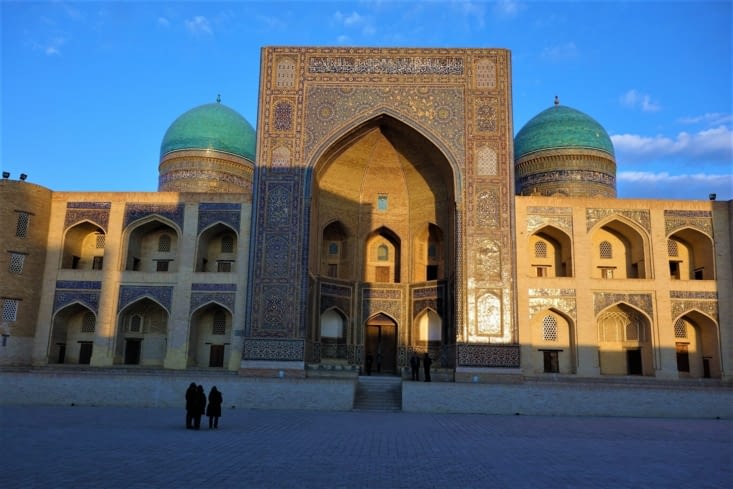
Français
C'est maintenant la fin de la journée et nous trouvons un restaurant pour manger. Rakhima travaille dans un hôtel de nuit, nous ne pouvons la voir ce soir.
Le lendemain matin
nous nous réveillons tard et nous avons la surprise de voir que le
petit-déjeuner nous attend : œufs, cakes, pudding, pain, beurre et
confiture. Nous mangeons avec Rakhima et son neveu. Il est très bon au tennis
et va s'entraîner cet après-midi. Nous l’accompagnons et jouons un peu avec
lui. ça fait très longtemps que nous n'avons pas joué au tennis et il est largement meilleur que nous, mais c'est marrant ! Sur l'autre terrain, le fils de Rakhima est en train de jouer au tennis avec un ami.
English
Then it's almost the end of the day and we go to a small restaurant. Rakhima is working in night time in the hotel, so we can't see her tonight.
We wake up late and we are surprised to see that the breakfast is already waiting us when we open our eyes. It's really too much: eggs, cakes, kind of rice pudding, bread, butter and jam. We eat it for lunch and Rakhima is joining us to share the food, as well as his nephew. He is really good at tennis apparently and he's going to play with friend after lunch. So we propose to go and have a look. When we are waiting his friends, he asks us to play with him. Flavie starts to be the sparring partner, and then Julien. In fact, it's a long time we haven't play tennis, and he's really better than us, but it’s fun. On the other playground, Rakhima's son is playing tennis too with a friend.
Français
Après un moment, nous laissons les enfants jouer entre eux. C'était vraiment cool de faire une activité « normale » et non pas touristique ! Nous allons ensuite à la Poste puis faire quelques courses pour le voyage en train de ce soir. Nous remarquons qu'ils utilisent de la menthe pour décorer les platebandes, et Favie en prend un peu pour la sentir.
De retour à la maison, Rakhima est en train de préparer des Manti à la citrouille avec son fils. Flavie propose son aide. Elle est très contente d'apprendre à faire les fameux « raviolis » d'Asie Centrale.
English
After a while, we let the children play together. It was really good to do “normal activities”, not touristic activities for a while and to feel like we are part of a family ! Then we go to the post office and to the market to buy food for our train journey. We notice that they use mint to decorate the flowerbeds, so Flavie takes some to smell it ;-)
When we are back to Rakhima's house, we discover that she is preparing pumpkin manties with her children. Flavie proposes her help to cook and discover how to do this famous dish of Central Asia.
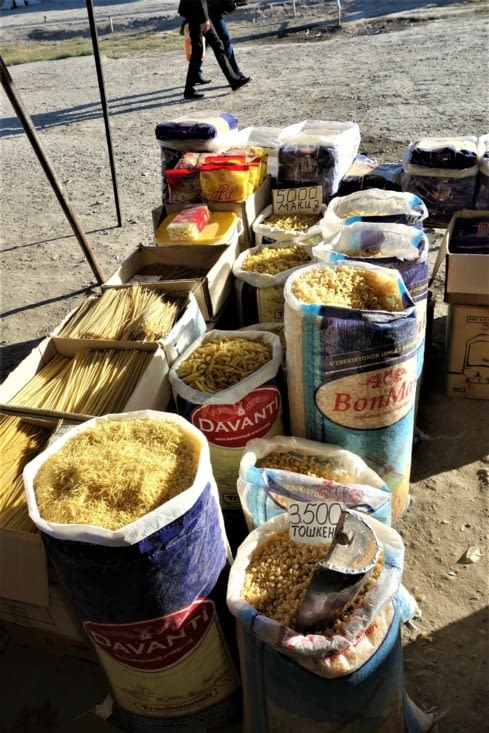
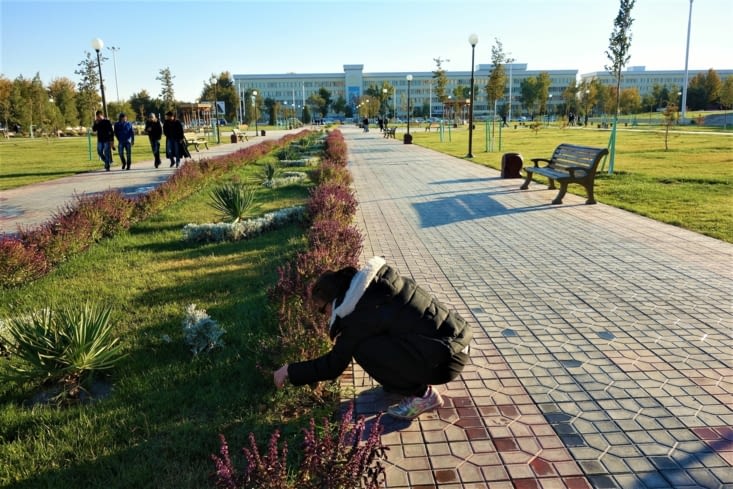
Français
Bien sûr au dîner nous mangeons les mantis que nous venons de préparer. Il est maintenant 20h et il est temps de partir pour la gare. Nous disons au revoir à Rakhima et sa super famille. Nous devons d’abord prendre un train jusqu’à Navoy puis changer vers 23h pour un train allant à Nukus. Dans le train, 2 Ouzbeks veulent faire la discussion avec nous (même s'ils ne parlent pas du tout anglais). Ils nous proposent d'écouter de la musique ouzbek et veulent entendre de la musique française. Ils nous demandent si nous sommes mariés et si nous avons des enfants. Cette question revient très souvent en Asie Centrale. Bien sûr nous disons que nous sommes mariés car il est mal vu d'être ensemble sans être officiellement mariés. Ils ne comprennent pas pourquoi nous avons plus de 25 ans et que nous n’avons pas encore d'enfants ; nous disons que c’est prévu pour plus tard. Lors que Julien dit qu'il est plus jeune que Flavie (d’un an seulement ;-), ils sont choqués, ce ne serait pas acceptable pour eux que leurs femmes soient plus âgés qu’eux.
English
Of course at the dinner we eat the manties we just prepared. It was really good :-) Then it's almost 8 pm and it's time for us to go the train station. Rakhima has called a taxi and we say goodbye to her and her lovely family. We need first to take a train to Navoy and then change there around 11 pm for the train going to Nukus. In the train, two guys are willing to speak with us, even if they don't speak English. They propose us to listen Uzbek music and they want to hear French music too. They also ask us if we are married or not, and if we have children. It's a question coming back very often in Central Asia. Of course we say that we are married, because it's not well seen that a man and a woman are in couple without being married. Regarding the children, they don't really understand why we are more than 25 years old and we don't have any children. So we say that it's planned for later on. When Julien is telling them that he is younger than Flavie (only one year of difference ;-), they are chocked, it's seem not possible for them to accept that their wives are older than them.
Français
Une fois à Navoy, nous avons un changement de train, nous nous dépêchons de monter dans notre correspondance sans regarder notre numéro de voiture et bien évidemment elle se trouve à l'opposé ! Il est plus de minuit, nous devons traverser tout le train et tout le monde est en train de dormir. Nous sommes obligés de déranger tout le monde car le passage est étroit et nous avons nos gros sacs à dos. Sur le passage nous pouvons voir que le chauffage est au charbon.
English
Once in Navoy we have to hurry for the change because our train has left Bukhara late. So we go into the train without looking at the car number. Of course, our car is on the opposite side of the train, so we have to cross all the cars, but everybody is sleeping and the way is quiet narrow, so it's really difficult with our backpacks not to wake all the train's passengers. We can see on the way that coal is used to warm the train.
Français
Cette fois, nous ne sommes pas dans un train moderne, c'est un vieux train-couchette. La voiture est divisée en sections de 6 lits, 4 lits qui se font face et 2 lits dans le couloir. Les lits dans le couloir ne sont pas très large pour dormir, mais n’avons pas le choix !
English
This time we are not in a modern train, it's an old USSR sleeping train. The cars are divided in sections of 6 beds, 4 beds facing each other (2 up and 2 down) and 2 beds along the corridor. It's quiet narrow to sleep in the beds along the corridor, but we don't have other choice!
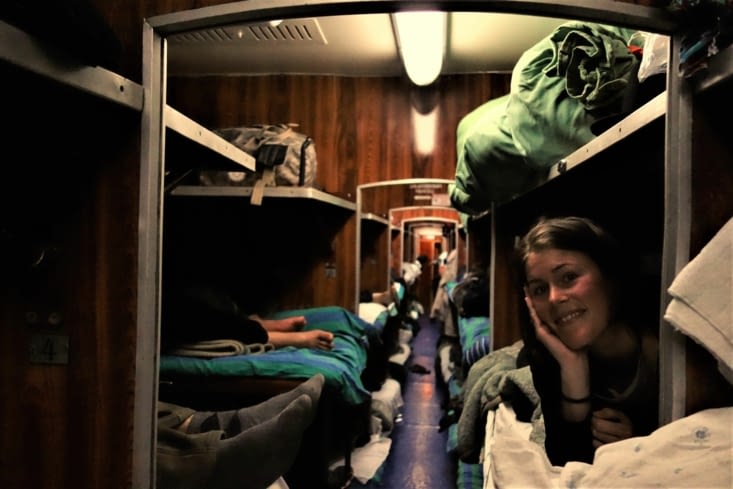
Français
Nous passons toute la journée dans le train, le paysage est sec et vide. C'est le désert ! Nous avons le temps de faire une sieste. Il y a des vendeurs dans le train, comme en Chine ou en Thaïlande. Ils vendent de la nourriture mais pas que ! On peut acheter du dentifrice, du papier toilettes ou d’autres produits de base mais aussi des produits plus élaborés (comme des batteries externes pour téléphone ou des jouets pour enfants) ! En fait, le train est un peu la ligne de vie de cette partie du pays, il y a seulement une route en parallèle de la voie ferrée et c’est tout. Ainsi tout le commerce se fait le long de ces deux voies de communication et de transport.
Le train n'est pas le moyen de transport le plus rapide : 20 heures de train pour atteindre Nukus depuis Bukhara, mais au moins c’est assez simple. Par exemple, le train s’est arrêté 3h dans la gare d’Urganch, une ville sur le chemin ; nous aurions certainement pu éviter ce temps d’attente en prenant le bus.
English
We spend all the day after in the train, the landscapes are totally dry and empty. It's the desert ! Of course, we have time for a nap ^^ There are sellers in the train, like in China or Thailand for example. They are selling food, but not only. You can sometimes buy toothpaste, toilet paper or different basic products, as well as more elaborated (like power bank for phone or toys). In fact the train is a little bit the safety line of this part of the country, you have only one road and one railway parallel, that's all. So all trading is done along these two communication ways.
The train was probably not the fastest option, as it finally takes around 20 hours to reach Nukus from Bukhara, but at least it was easy. For instance, we wait around 3 hours in the station of Urganch (a city on the way), something we could maybe have avoided in bus.